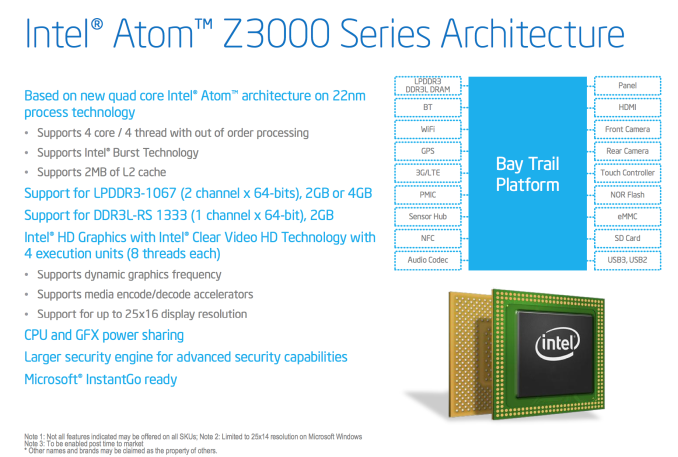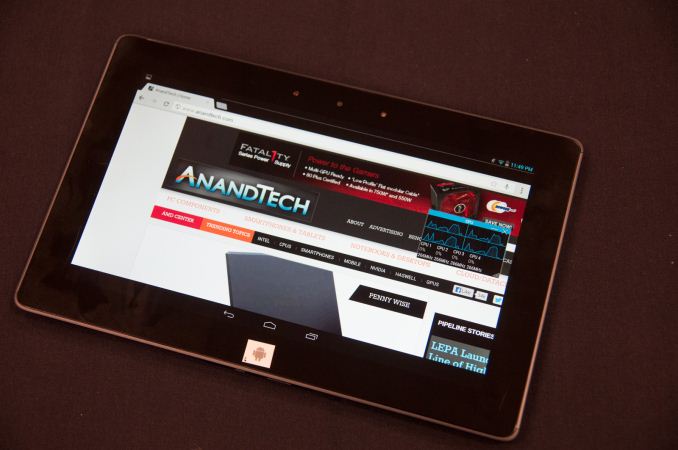The Bay Trail Preview: Intel Atom Z3770 Tested
by Anand Lal Shimpi & Brian Klug on September 11, 2013 12:00 PM ESTFinal Words
At its Silvermont disclosure, Intel promised performance better than any other ARM based core in the market today. Looking at our Android results, Intel appears to have delivered on that claim. Whether we’re talking about Cortex A15 in NVIDIA’s Shield or Qualcomm’s Krait 400, Silvermont is quicker. It seems safe to say that Intel will have the fastest CPU performance out of any Android tablet platform once Bay Trail ships later this year.
The power consumption, at least on the CPU side, also looks very good. From our SoC measurements it looks like Bay Trail’s power consumption under heavy CPU load ranges from 1W - 2.5W, putting it on par with other mobile SoCs that we’ve done power measurements on.
On the GPU side, Intel’s HD Graphics does reasonably well in its first showing in an ultra mobile SoC. Bay Trail appears to live in a weird world between the old Intel that didn’t care about graphics and the new Intel that has effectively become a GPU company. Intel’s HD graphics in Bay Trail appear to be similar in performance to the PowerVR SGX 554MP4 in the iPad 4. It’s a huge step forward compared to Clover Trail, but clearly not a leadership play, which is disappointing.
The big unknowns are things like video decode power efficiency, perf and quality of their ISP and idle power efficiency vs. Qualcomm.
Bay Trail looks like a good starting point for Intel in mobile, and the performance of Silvermont makes me excited for Merrifield in phones next year. What Intel needs to do going forward is simply continue to iterate and execute for the next few generations after Bay Trail and it will have a real chance at success in mobile.
My biggest concern is about the design wins we see based around Bay Trail. Although Intel is finally in a spot where it can be in devices on the market, none of those devices thus far have been any good. Bay Trail is attractive enough to garner more design wins for certain, the question is whether or not the quality of those wins will improve as well. In the tablet market there’s the iPad and the Nexus lines that are really the most interesting, and I don’t expect Bay Trail to be in either. Whether or not the quality of the rest goes up this generation and we find a Bay Trail in one of those devices remains to be seen.












190 Comments
View All Comments
Dentons - Wednesday, September 11, 2013 - link
Whether Intel's chips are "only" 50% more expensive or 100% more expensive, why would that motivate a move to Intel? What's the advantage? A 5% performance gain? That's not a motivator. Especially considering the considerable advantages of ARM. With ARM, tablet builders can purchase CPU's from a multitude of manufacturers. With X86, that competition would be non-existent.Were Intel to have a 50% or 100% performance advantage, some manufacturers might be enticed, at least for their higher end products, but that's not where we are. As things stand now, only those manufacturers needing X86 compatibility are likely to bite. The only need for X86 is Windows. So other than the handful of Android tablets that Intel pays to have built, all of these chips will go into Windows 8 machines. Likely 99% + of shipping volume.
This is a chip designed to prolong the WinTel duopoly. That is this chip's best case scenario. It's going to have almost no real-world uptake in Android and absolutely no uptake on iOS. Its intrusion into the mobile ecosystem will, at best be 5% to 10%.
This is small time.
rabidkevin - Friday, September 13, 2013 - link
"The only need for X86 is Windows."Last time I checked, x86/x64 is used for windows, linux, mac osx, ps4 and xbox one.
Dentons - Tuesday, September 17, 2013 - link
To clarify, I was referring to this specific chip, not X86 in general. Were I being overly precise, I'd have written "The only significant market need for this particular, mobile-specific, low-power X86 chip is Windows."It's hard to see any of the other markets you've mentioned needing, wanting, or using these chips. That's a massive problem for Intel, as right now, the tablet market is almost entirely iOS and Android. For iOS and Android, X86 compatibility is at worst a significant liability, at best, a completely unneeded expense.
It seems unlikely Intel will see much uptake with Apple or Android manufacturers. How else can Intel gain traction in the Tablet market if not with Windows? And that, as we know, requires the Microsoft tax, pricing Intel well out of the current tablet market.
Intel's in a tough spot. While they have finally released a chip with power / performance parity to ARM's latest, it may be 5 or 6 years too late.
Kidster3001 - Thursday, September 12, 2013 - link
All of your arguments apply to the Home PC market in 1980 where Intel had zero market share. What happened in the next decade?All of your arguments apply to the Server market in 1990 where Intel had zero market share. What happened in the next decade?
All of your arguments apply to the Supercomputer (HPC) market in 2000 where Intel had zero market share. What happened in the next decade?
I wouldn't be so quick to count Intel out in the long run.
ancientarcher - Friday, September 13, 2013 - link
I think the same thing that Intel did to the RISC based processors in the 1980s, 90s and 2000s will be done to it by ARM. Disruption from below, my friend.and what did happen - first you say the competition is cheap and low quality (on whatever metrics) and ignore it. then you say the same thing, but secretly tool up to compete (which takes a few years), in the meantime, the cheap but good-enough parts are improving much faster than you are. The reason you take time to compete is because you don't see much money there and by corporate style IRR calculations it doesn't make sense to compete. By the time you are ready to compete (which takes many years, 5-6 in the case of Intel), the erstwhile cheap and bad competition has become cheap and competitive and finally cheap and good, then better. Then you die.
Watch and see what happens to Intel in 3-4 years...
MyOpinionDoesNotMatter - Saturday, September 14, 2013 - link
Intel dead in 3-4 years??? I Hope ARM chip manufacturers take the Intel threat more seriously than you do. Intel have the resources and now (finally) the mobile focus to one day have a monopoly...for the sake of us consumers I hope ARM chips can remain competitive in the long run. Intel have caught up a lot in Bay Trail and this will make the next generation of chips very interesting. We may end up with a situation similar to Intel/AMD in high TDP chips....Intel for high performance mobile/tablets and ARM chips for the low end.jhoff80 - Wednesday, September 11, 2013 - link
I know that this is slightly off topic, but I was under the false impression that Connected Standby would be coming to 8.1 even on the architecture. Are there any plans whatsoever to bring that feature?It's not a huge deal, but it'd be nice for Skype calls or even for Windows 8.1's new "Alarms" app to have that support. It actually makes the idea of upgrading to a Haswell tablet from my Surface a bit less appealing.
zeo - Wednesday, September 11, 2013 - link
Connected Standby is supported and has been support, it's only new for Intel's higher end process but Haswell will bring that support to the Core processor... The ATOM SoCs already had it... It just requires both the OS, system firmware, and hardware support to work...If anything is off, like bad wifi drivers, then it won't work correctly...
jhoff80 - Thursday, September 12, 2013 - link
Well, first of all, that was supposed to say "I was under the false impression that Connected Standby would be coming to 8.1 even on the x64 architecture."Secondly, what I'm referring to is the quote from the article: "Although the core architecture is 64-bit in design, there will be no OS support for 64-bit Bay Trail at launch. Windows 8.1 with Connected Standby appears to still be 32-bit only"
I'm completely aware that it depends on every part of the chain and that support for it is now available in Haswell, but that doesn't do much if I can't use all of my 4 or even 8GB of RAM with that fancy new chip.
UNCjigga - Wednesday, September 11, 2013 - link
Sounds like the ideal platform for a sub-$200 Chromebook, but I'm still wary of Windows 8.1 performance.